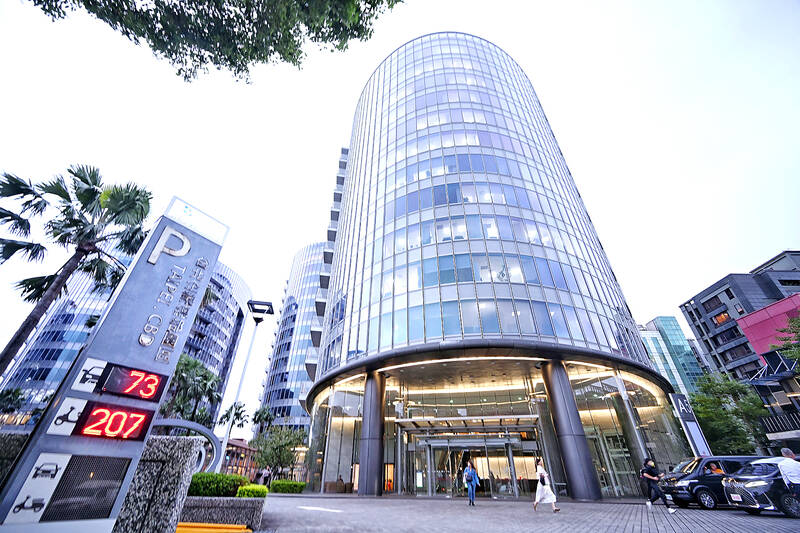Formosa Plastics Group (台塑集團), Taiwan’s largest industrial conglomerate, yesterday said that three major subsidiaries incurred losses last quarter while the fourth eked out a tiny profit, as soft market demand and price competition weighed on their earnings.
Nan Ya Plastics Corp (南亞塑膠), whose main business involves making processed plastic and chemical products, electronic materials and polyester fiber, recorded NT$60 million (US$1.86 million) of net profit during the July-to-September period, or earnings of NT$0.01 per share, the company said.
The lackluster results suggested a slowdown from three months earlier, while declining international oil prices weighed on plastic and chemical products.

Photo: Fang Pin-chao, Taipei Times
Their profit margin was also harmed by unfavorable currency exchange rates and the need to recognize losses in the affiliated Formosa Petrochemical Corp (台塑石化), it said.
However, selling prices picked up for materials used in polyester and printed circuit boards ahead of the high sales season for technology products, it added.
Formosa Petrochemical Corp (台塑石化), primarily engaged in the business of refining crude oil, selling refined petroleum products and producing and selling olefins from its naphtha cracking operations, booked losses of NT$3.08 billion, or NT$0.32 per share, worsening from three months earlier, it said.
The privately owned refinery attributed the poor showing to tepid demand and oil export nations’ announcement that they would cut output from December amid a supply glut.
The drop in oil prices grew more evident last quarter and deepened losses of inventory and purchased materials, the company said.
Inventory losses alone amounted to NT$2.42 billion, surging from NT$170 million in the April-to-June period, it said.
Formosa Plastics Corp (台灣塑膠), a vertically integrated supplier of plastic resins and petrochemicals, reported losses of NT$3 billion, or NT$0.49 per share, as it idled seven plants to conduct annual maintenance, up from four in the preceding quarter, the company said.
The bleak figures stemmed from unprofitable core businesses and unfavorable influences of Typhoon Gaemi in July that disrupted the operation of plants in Kaohsiung and weakened their output, it said.
At the same time, raw material prices remained high, putting pressure on the profit margin, it said.
The company also recognized losses from indirect investments in affiliated businesses in Taiwan and in the US.
Formosa Chemicals and Fibre Corp (台灣化學纖維), which produces and sells petrochemical products, nylon fibers and rayon staple fibers in Taiwan and internationally, posted losses of NT$1.93 billion, or NT$0.33 per share.
Listless market demand and selling prices were to blame, the company said, adding that it is reducing capacity to speed up inventory adjustments.
The company is closely monitoring China’s latest stimulus measures and would move to take advantage of any business opportunity, it said.

Taiwan will prioritize the development of silicon photonics by taking advantage of its strength in the semiconductor industry to build another shield to protect the local economy, National Development Council (NDC) Minister Paul Liu (劉鏡清) said yesterday. Speaking at a meeting of the legislature’s Economics Committee, Liu said Taiwan already has the artificial intelligence (AI) industry as a shield, after the semiconductor industry, to safeguard the country, and is looking at new unique fields to build more economic shields. While Taiwan will further strengthen its existing shields, over the longer term, the country is determined to focus on such potential segments as

UNCERTAINTY: Innolux activated a stringent supply chain management mechanism, as it did during the COVID-19 pandemic, to ensure optimal inventory levels for customers Flat-panel display makers AUO Corp (友達) and Innolux Corp (群創) yesterday said that about 12 to 20 percent of their display business is at risk of potential US tariffs and that they would relocate production or shipment destinations to mitigate the levies’ effects. US tariffs would have a direct impact of US$200 million on AUO’s revenue, company chairman Paul Peng (彭雙浪) told reporters on the sidelines of the Touch Taiwan trade show in Taipei yesterday. That would make up about 12 percent of the company’s overall revenue. To cope with the tariff uncertainty, AUO plans to allocate its production to manufacturing facilities in

COLLABORATION: Given Taiwan’s key position in global supply chains, the US firm is discussing strategies with local partners and clients to deal with global uncertainties Advanced Micro Devices Inc (AMD) yesterday said it is meeting with local ecosystem partners, including Taiwan Semiconductor Manufacturing Co (TSMC, 台積電), to discuss strategies, including long-term manufacturing, to navigate uncertainties such as US tariffs, as Taiwan occupies an important position in global supply chains. AMD chief executive officer Lisa Su (蘇姿丰) told reporters that Taiwan is an important part of the chip designer’s ecosystem and she is discussing with partners and customers in Taiwan to forge strong collaborations on different areas during this critical period. AMD has just become the first artificial-intelligence (AI) server chip customer of TSMC to utilize its advanced

While China’s leaders use their economic and political might to fight US President Donald Trump’s trade war “to the end,” its army of social media soldiers are embarking on a more humorous campaign online. Trump’s tariff blitz has seen Washington and Beijing impose eye-watering duties on imports from the other, fanning a standoff between the economic superpowers that has sparked global recession fears and sent markets into a tailspin. Trump says his policy is a response to years of being “ripped off” by other countries and aims to bring manufacturing to the US, forcing companies to employ US workers. However, China’s online warriors